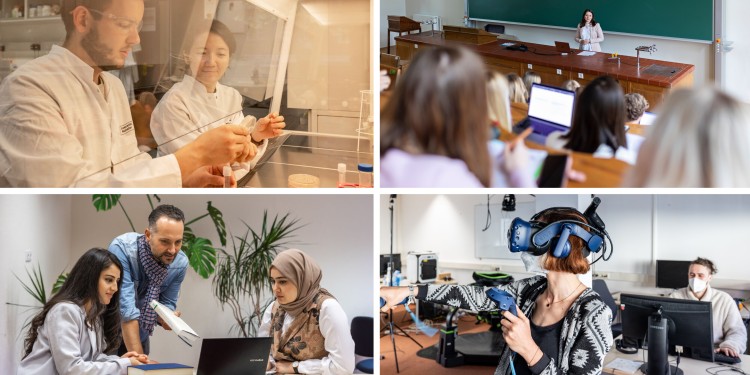
In-depth debate on studies and teaching
The University of Münster is on the way to establishing a quality management (QM) system with the aim of system accreditation – a long process, and one which kicked off at the beginning of the year. In gaining system accreditation, a university has the right to award the seal of the Accreditation Council for the courses of study for which it holds examinations. One of the requirements of system accreditation is for the University of Münster to have a binding “Mission Statement on Study and Teaching” which reflects the content of the curricula of the approximately 270 courses of study offered at the University. A first draft of this mission statement has been produced, which means that a University-wide debate, with everyone participating, can now begin.
Background to the process
Any accreditation of courses of study at Münster University had previously been undertaken every eight years as part of a programme accreditation. However, the effect of quality assurance is now reaching the limits of this construct. By establishing an internal QM system, on the other hand, new opportunities will be opened up for everyone at the University to engage in discussions together on studies and teaching. The great advantage is that an assessment process conducted internally provides the University with ways of shaping issues concerning specific University and subject-related themes, as well as defining its own standards and quality objectives – making it a QM system which meets the needs of the University, within the legal requirements.
University-wide participation
A basic requirement for the acceptance and successful implementation of this long-term project is the early involvement of the faculties, the students and the teaching staff. A project group has been set up – headed by Prof. Ulrike Weyland, Vice-Rector for Studies and Teaching, and Eva Mundanjohl, Head of the Academic and Student Affairs department within the University administration – and this group will direct the process and maintain a dialogue with relevant University players. One of the most important elements is a new “network of QM officers” in the faculties. This network will contribute expertise from the faculties directly to the project and to the new process flows. Ulrike Weyland is confident that, “even if, at first, a lot of work will be required to get new things started and to initiate debates, this approach will provide many opportunities in the medium and long term for systematically achieving lasting improvements to the quality of studies and teaching.” Also, the project group is especially concerned that students should be involved at an early stage – and then long-term. This will mean that students will have an opportunity to further develop their own courses of study and to experience changes and improvements in their studies while they are still at the University.
Over the past three months, the members of the project group have paid visits to all 15 faculties and to other central institutions, presenting the process, its phases and the associated requirements. These include not only developing the mission statement mentioned above, but also building up a QM system, internal accreditation and the subsequent controlling measures.
“Before we talk about the content of the QM system and relevant measures,” says Eva Mundanjohl, “we will need to define how we see ourselves in terms of values, attitudes and aims and how these relate to the quality of courses of study at university. In other words, we need to lay down the foundations on which everything else in QM is based. And we can only do that as a team.” In addition, this self-image must be in alignment with the principles and strategy papers which already exist at the University. These include the mission statements on Diversity and Sustainability, the rules for Good Scientific Practice or the University Development Plan.
Next steps on the Mission Statement on Study and Teaching
The mission statement is a self-image of how we, all together, see ourselves and which all members of the University can share and identify with. To this end, a working group has produced a first draft containing overarching principles and various fields of action. Prof. Martin Bonsen, the chair of the University’s Teaching Council, was elected to head the group. At the beginning of May, the faculties, the central institutions and various bodies are to receive a draft of the mission statement, so that they can enter into discussions relating to the faculties. Feedback is to be given to the working group by the beginning of July.
After this, a final version, based on this feedback, will be forwarded to the relevant University bodies so that the Senate can approve the mission statement in December. The mission statement is to be taken up as a framework for guidance on further curricular work in courses of study. As regards the next steps to be taken in their work, the two project leaders are in agreement that “such a project for a University of our size – and keeping to such a tight schedule in the process – really is challenging. But the most important thing is that the entire University sees itself as a team, all contributing to its success.”
Author: Kathrin Kottke
This article first appeared in the University newspaper wissen|leben Nr. 4, May 3rd 2023.
